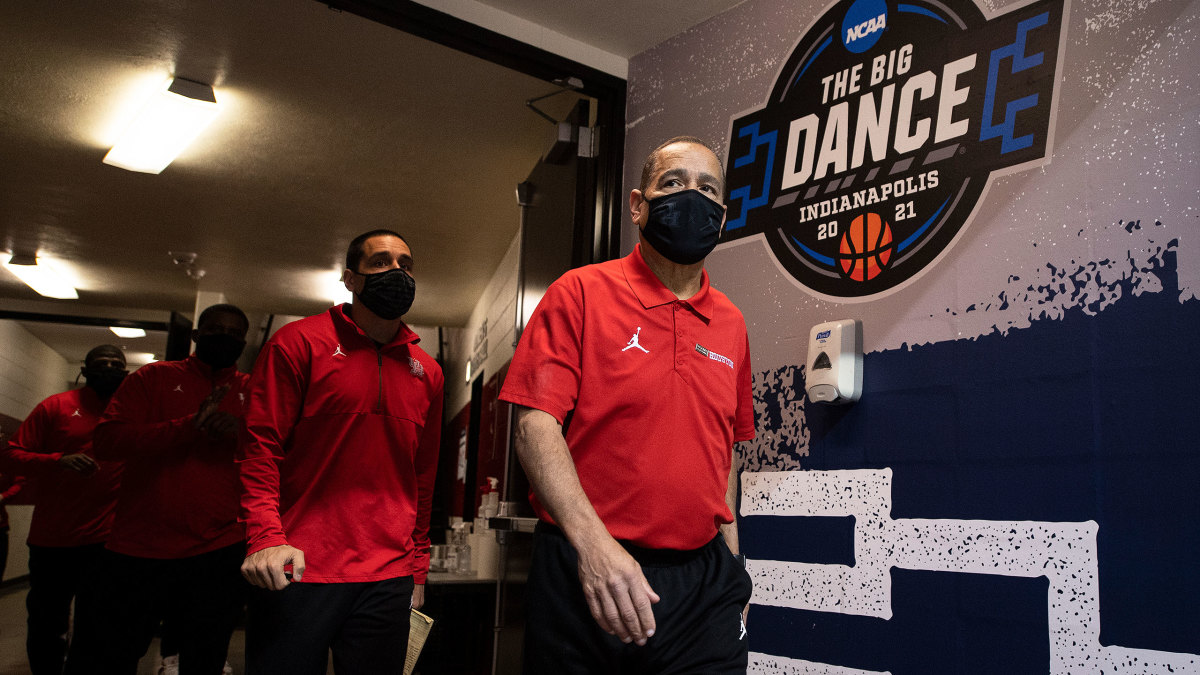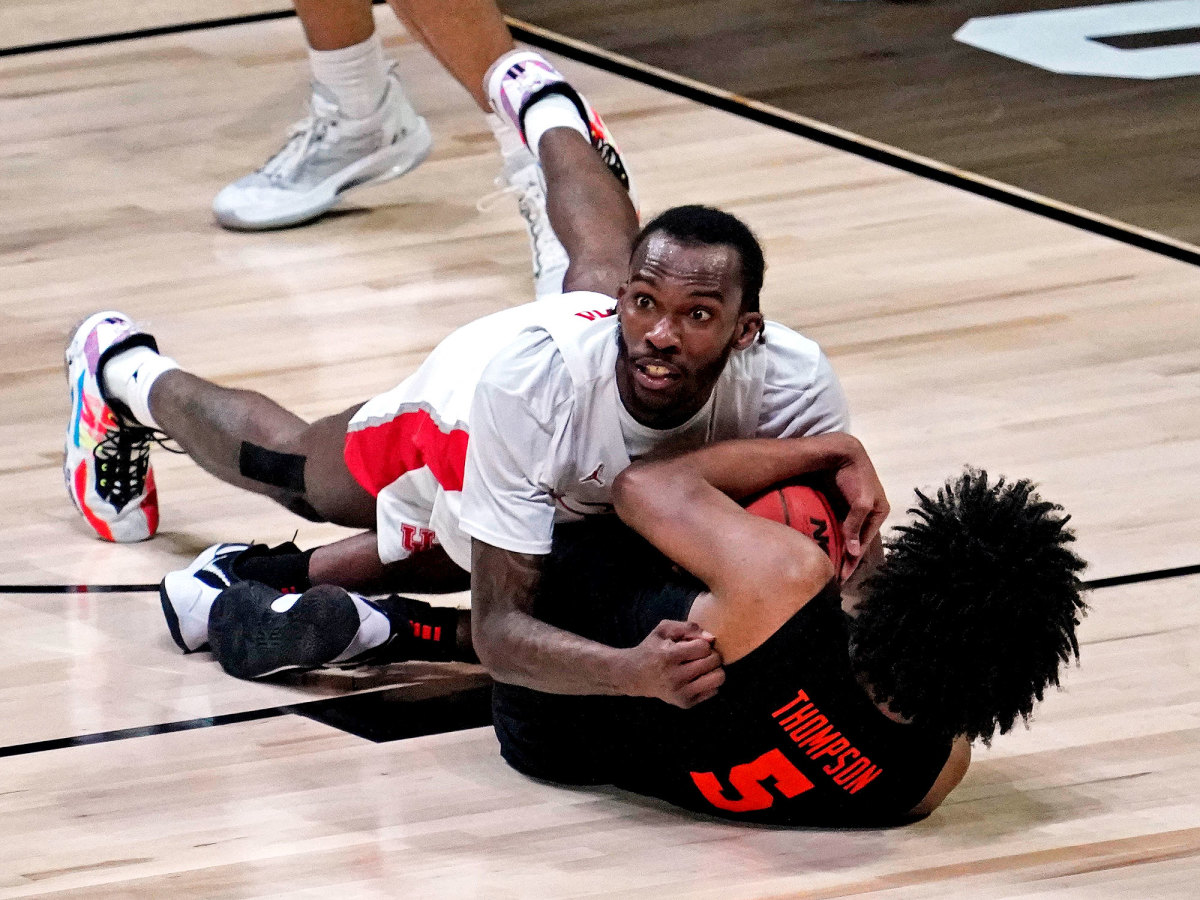Phi Slama Jama Relishing Houston's Return to Prominence Under Kelvin Sampson
INDIANAPOLIS — Among the more underrated aspects of the Phi Slama Jama legacy is an unparalleled collection of nicknames. Back when the Houston men’s basketball team soared and dunked and slammed its way into college hoops history, the Cougars featured The Dream (Hakeem Olajuwon), The Glide (Clyde Drexler), a Mr. Mean (Larry Micheaux), a Silent Assassin (Michael Young), a Cadillac (Gregory Anderson) and the Bomber From Bernice (Benny Anders). A team with that collection of monikers deserved its own reality show.
Houston’s Phi Slama run—those high-flying, fast-paced, highlight-producing, convention-defying squads from 1982–84—certainly qualified for prime-time TV. “People around the world think of us as the greatest basketball team ever,” Drexler says. “We came out of nowhere, we overachieved and people perceived us as all flash-and-dash. But we were a lot more than that.”
Teammates called Lynden Rose, an ’82 co-captain, by the less-than-politically-correct nickname Pancho, because he could speak a little Spanish. Rose, now a prominent Texas attorney and former Board of Regents member at his alma mater, can still recall those long-ago seasons in high definition, such was the imprint that they made.
Phi Slama existed, Rose says, because of the late Guy V. Lewis, the head men’s coach at Houston from 1956–86. Lewis encouraged his players to develop their best skills rather than fit into traditional boxes. He sought athleticism, versatility, explosiveness—and he nurtured those attributes with few restrictions. He recruited Olajuwon from Nigeria, snagged Anders from Louisiana and convinced local stars like Drexler and Young to stay home. (According to legend, Drexler indoctrinated new members of the jamming fraternity by throwing down a tomahawk as they stood underneath the basket. They had to fill three-hour practices with something, The Glide says.)
Rose and Drexler watch the latest Houston team closely now, the one coached by Kelvin Sampson that returned the university to the Final Four for the first time since his playing days. They’ll play Baylor on Saturday evening. And both see parallels beyond the Phi Slama Jama merchandise that school officials began hawking back in January. Again, Rose would start with a coach who imprinted his personality on a team.

Sampson, of course, won hundreds of games as the coach at Washington State, Oklahoma and Indiana, where he resigned due to NCAA violations in 2008. The Hoosiers would receive probation; Sampson, a five-year show-cause order that forced him into the NBA assistant ranks. At least until 2014, when he assumed control of a Houston program that did not resemble those Phi Slama Jama squads.
The Cougars went 13–19 in his first campaign, despite a strong season from guard L.J. Rose, Lynden’s son. They’ve won at least 21 games in every year since, the losses in single-digits the last four seasons. And while the elder Rose would not describe Sampson’s re-emergence as redemptive, he would call the Cougars' basketball resurgence remarkable, nonetheless. “Sampson is working miracles and getting basketball back to the level that it should have reached a long time ago,” Rose says. “Kelvin Sampson is the best basketball coach in America.”
He pauses, then clarifies in even stronger language. “I’m not just talking college,” Rose says. “High school, NBA, you name it. He’s the best basketball coach in America.”
For those in the PSJ dunking fraternity, these Cougars remind them of the best years of their lives. Rose says practices were more competitive than “90%” of the games that Houston played. There were dunks, dunks and more dunks, so many slams that the statisticians struggled to keep track as UH advanced to the Final Four in ’82. The Cougars lost to eventual champion North Carolina and a young guard named Michael Jordan. But they made it further the next season, all the way to the title game, where they fell to North Carolina State on a buzzer beater from Lorenzo Charles. They even went back the next year, falling again in that final game, only this time, to Patrick Ewing and the Georgetown Hoyas.
Along the way, a local sportswriter named Thomas Bonk is credited with coining a nickname for the ages. Phi Slama Jama would endure beyond any of the Cougars' statistical accomplishments. Like the two title game appearances, the trio of national semifinal berths, the four Southwest Conference championships and the presidential term spent mostly inside the top 10 of any national ranking system. They even helped launch the career of an iconic broadcaster.
Jim Nantz was a Houston undergrad back in those days; he was also a member of the golf team and not a particularly decorated one at that. But he did meet Lewis, the Cougars coach, and when Nantz asked if Lewis might have anything for him to do, the coach made him the public address announcer—at age 19. Nantz would come to host Lewis’s weekly TV highlight show, granting the young journalist an insider view of a team as explosive and electrifying as any in college hoops history. Nantz may have called buzzer beaters and epic finishes at The Masters, but he still remembers riding the Houston team bus to the first national title game.
“It’s hysterical now,” Drexler says. “Here was this golfer, an alternate who wasn’t getting much run. But he had the golden voice.”)
He can also remember, same as all Cougars fans from the PSJ days, how his alma mater would secure a men's tournament bid only four more times from Phi Slama to Sampson, with no NCAA tourney wins from 1992–2010. Sampson changed that. Houston returned to the tournament in 2018 and again the next year, landing a No. 3 seed and reaching the Sweet 16.
Nantz will call the Final Four here, and on Thursday, while the participants readied for Saturday’s match-ups—Houston will play Baylor in the first game—the broadcaster snuck back to H-Town to visit family. Everywhere he went, he heard the same theme: Houston men's basketball was relevant again.
While these Cougars may lack nicknames, they are an easy team to like. There’s Quentin Grimes, the versatile guard and homegrown star who averages 18 points. There’s point guard DeJon Jarreau, whose deft passing leads to more than a few dunks. And there’s Marcus Sasser, among others, a sophomore guard who won the basketball scholarship created and endowed by Nantz and his friends.

Houston reached Phi Slama territory with NCAA victories over Cleveland State, Rutgers, Syracuse and Oregon State. It advanced despite missing Caleb Mills, the American Athletic Conference’s preseason player of the year who played just four games this season before transferring to Florida State. It wowed despite a rash of positive COVID-19 tests in December, too.
The Cougars won in stark contrast to the Phi Slama style, with rebounding and defense, their march unglamorous rather than electrifying. But that approach, Nantz says, speaks to Sampson the same way that dunk city long ago spoke to Lewis. The Cougars rank second nationally in scoring defense (57.5 points per game) and scoring margin (19 points) and have limited opponents to 37.3% shooting, lowest in Division I. Lewis loved defense, too, Nantz quickly points out. But should these Cougars create their own legacy here over the next few days, it will be less for how they play and more for whether they can win the one game the PSJ members never did.
Drexler believes that Phi Slama played defense at a much higher level than they’re credited for. He calls those squads “stellar defensively” and “some of the best defensive teams in the country.” He says that Lewis should be credited for his defensive emphasis in the same way that Dean Smith and John Wooden have long been. Dunks worked for Phi Slama, Drexler says, not because they were flashy but because they were the most efficient way to score. And the more he talks, the less those Cougars and these Cougars seem all that different. They were—and are— grounded in fundamental basketball, which, yes, includes dunks. “The way they defend is why they are where they are,” Drexler says. “Same for us.”
Not that this Houston team lacks all style, either. “Their offense is so fast, with all the cutting and bobbing and weaving and passing it around on the perimeter,” Nantz says. “It’s moving at a speed I’ve never seen before. It was poetic to watch, the way everything just fit together.”
Rose adds: “These guys have the same swagger we did. These kids are resilient.”
Nantz recalls meeting Kevin Costner once, shortly after the actor won best director and best actor for Dances with Wolves. Nantz asked Costner what it took to be a great director, and Costner told him that he had to obsess over every single person’s job, not just the actors but also anyone on set. He needed to explain the vision in his head to them. That’s Sampson, Nantz says, directing the Houston men's basketball team back to prominence. Same as Lewis, the coach who Nantz lobbied for years to land a spot in the Hall of Fame. (Lewis would be inducted in 2013. “He deserved it while he was alive,” Drexler says. “I’m glad that happened, even if it was long overdue. He was innovative. He had vision. And he was the most competitive person I’ve ever been around. He would arm wrestle us, and he would be smiling.)
“We know we’re making history,” Jarreau told reporters after the Cougars triumph in the Elite Eight. The guard wasn’t born until 1998, and he learned of Phi Slama Jama mostly through stories, old YouTube clips and the excellent PSJ-focused 30-for-30 film. But Jarreau is now part of the team that connects then to now.
Rose expects several members of Phi Slama to descend on Indianapolis for the Final Four, himself included. Drexler plans to root at home with a small group of close friends. This time, the famous dunkers will watch rather than play, hoping the Cougars of 2021 can do what they almost did. Almost. “We are all a part of this,” Rose says. “Now, they just need to win it.”
